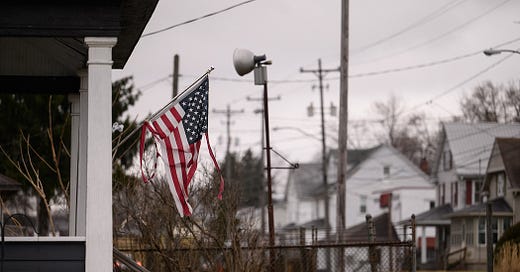‘We Don’t Know What We Are Breathing’: A Report from East Palestine

A tattered flag hangs from the porch of a home in East Palestine, Ohio. (All photos by Justin Merriman for The Free Press)
A train derailment and chemical explosion that ripped through an Ohio town earlier this month have left locals feeling sick, angry—and completely abandoned.
535
For three decades, Barbara Kugler has lived less than a block from the Norfolk Southern railway line that crosses through East Palestine, Ohio. Up until this month, the sound of an oncoming freight train’s warning whistle—long, long, short, long—used to be a comfort.
But now when she hears it, she tenses.
“For thirty years that sound meant home. It was p…
Enjoying the story?
Enter your email to read this article and receive our daily newsletter.
Already have an account?
Sign In




